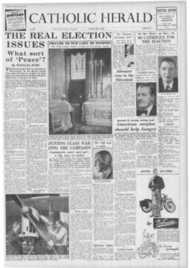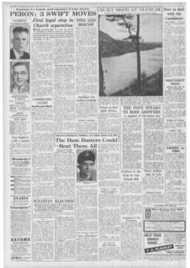Page 2, 20th May 1955
Page 2

Report an error
Noticed an error on this page?If you've noticed an error in this article please click here to report it.
Tags
Share
Related articles
Cardinal Cancels Vatican Official’s Latin Mass
All Seminaries
Roman Collars And White Cravats
A Roman Ancestry For The English
Post-reformation Wales
Who are the English ?
Sir,-I boiled with rage and anger when 1 read this unhistorical nonsense:" Though England is fundamentally Roman, at least in having been formed originally by the Romans, it has such an extraordinary diversity of peoples that it is a wonder that the English were ever taken in by the Anglo-Saxon myth." I would like to inform Mr. Edwards that Bede. and Boniface (the latter one of the greatest Englishmen who ever lived. the man who converted half Europe to Christianity)both were Anglo-Saxons; and they were not mythical.
The Anglo-Saxons did not (I think) refer to themselves as such in their own speech-they called themselves Saxons. lutes and Engles (Angles is from the Latin Angli) until Eghert the West Saxon was crowned King of All England over 250 years before Hastings and decreed that thenceforth there would only he EnglesEnglishmen. It appears as if the Engles were a branch of the Saxon race who had outgrown the Test for they frequently referred to themselves as Saxons, and an Engle Bishop writing from Northumberland to Rome could address himself " de Saxonia." Other peoples called them simply "Saxons." a generic term (sometimes of abuse-Sassenach " is a Celtic corruption of the word) covering all the folks who lived on the Continental seaboard north of the Rhine, including those who migrated to Britain. It is a proud name meaning "Sword man." " Anglo Saxon" is a convenient term much used by Victorian historians. Modern historians prefer " Old English " and use " the continental English " of our people before they left the cradle-land in what is now Schleswig-Holstein.
But who are " the nation of the English " (Bede)? The historical answer is: We are the descendants and inheritors of " three of the bravest of the German tribes " (Rede again) who migrated after the fall of the Roman Empire and settled in that part of Britain which lies South of Scotland and East of Wales. The paternal element in our ancestry and in our speech, law and folk customs is entirely AngloSaxon and owes nothing to the Romano-British. This evidence in itself that at the time of the Saxon migrations there was very little intermingling between the two peoples for which the reasons, I suggest, lie in the character of both and are to the credit of both. Our ancestors were people of strong tribal and family loyalties (which is why the Romans named them Germani) and a Saxon Warrior would never desert his wife and family for a British woman. The Romano-British also were a people of fierce pride and they either died in battle or escaped to the mountains of " wild Wales." The remnants who stayed behind were very few. The British women would never have given themselves in large numbers to the Saxon invaders.
There is much confused use of the words " Britain," " England," " English.
" Britain " and " England " are geographical expressions. The "English Nation " are a group of families with common ties of blood, speech, literature, history and culture. " The United Kingdom " is a political institution in which are united four separate and distinct nations. " Country," "Nation " and " State " are not synonymous words.
The Anglo-Saxon period is in time near to one half of the entire history of the English people. It is impossible to study the Founders of the Nation without feeling that, with all their faults. they were most brave and honourable people and we ought never to abandon their memory. I feel that we have not been as loyal as we might and that this has been due to the imposition of an alien aristocracy after 1066 and the writing of history with a Norman bias.
The suggestion that the Nation " was formed originally by the Romans " is as unhistorical as the suggestion that we became a nation after and because of the Norman Conquest. The defeat at Hastings by William the Bastard of the battered survivors of Stamford Bridge was an unmitigated disaster which set back the development of our nation by two centuries. (We ought not to forget the glorious victory at Stamford Bridge, a terrible berserk battle in which we defeated the most famous military captain of the age, the former commander of the Varangian Guard, the King of Norway. 24 ships sufficed to take away the remnants of the host that came in 300 and we so crushed and broke the Viking spirit that never again did they venture forth as before-and they used to be the scourge of Europe.) G. C. D. Wheeler. 20. Upper Phillimore Gardens, Kensington, W.8.
Catholic Booksellers
Sir,-1 am sure that I am voicing the opinion of many small booksellers when I register a protest against the gratuitous advertising which is given to Ducketts in your correspondence columns. Last week a correspondent wrote about children's hooks on the Mass, and this week there is a letter about Group Captain Cheshire's books. In each case it was stated that these may he obtained from Messrs. Duckett's, address given.
I have nothing but admiration and gratitude for this firm; but at the same time I find that to many Catholics a book title invariably means Duckett's (or B and 0) without further assistance!
Would it not he possible In alter the sentence in the correspondence to stale that these hooks can he obained through any Catholic bookseller? Perhaps, then, some reader would think, a Catholic bookseller. . . ah, yes, the Friar's Repository, where I bought a book before.
J. Cleeves
Manager. The Friars Bookshop and Repository, AyIesford, Kent.
We recall on one occasion trying to publish a list of Catholic booksellers. but very few responded to a request for names and addresses.-Eot ton, C.H.
benefit from orthopaedic treatment, whether the child is Catholic or not.
Olive L. Bacon,
Secretary.
St. Vincent's Orthopadic Hospital,
Eastcote, Pinner, Mddlx.
blog comments powered by Disqus









